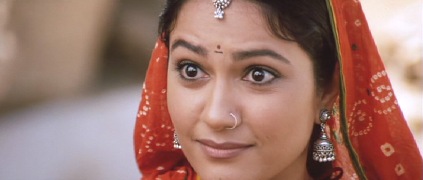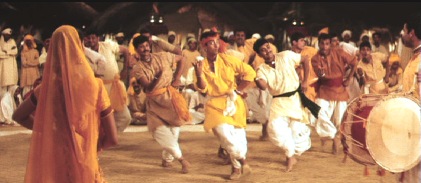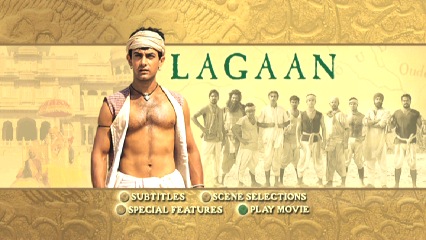 |
Cricket - the quintessential game invented by the English using red leather balls and ideally suited for the green, carpet-like cool grass of England with the players wearing cream-coloured flannels. The English loved their cricket so much that with the expansion of their empire they took this game to their colonies, including India where green grass gave way to hard brown soil, but the game remained the same with the English still wearing their warm flannels despite the Indian heat. Lagaan uses the game of cricket as the backdrop to provide entertainment for 3 hours and 45 minutes while looking at a number of social, political and cultural themes. |
|
|
LAGAAN
Once Upon A Time in India Directed by : Ashutosh Gowariker A review by Albert Michael |
||
 |
The year is 1893. The monsoon rains for the second year in a row have failed to arrive in the small village of Champaneer in the Kutch-Bhuj area of Rajasthan endangering the village crops. The village as well as the whole province pays Lagaan (i.e. taxes) by giving most of their grain crops to the local king Raja Puran Singh who keeps a share for himself and gives the rest to the British regiment in the area headed by one insensitive Captain Ambrose Russell. The actor Paul Hawthorne plays to a tee the wide spread behavior and attitudes of British officers during that colonial era. His body language, use of Indian language and treatment of Indians displays the characteristics of a real British sahib! | |
|
|
||
| With the failure of monsoons and consequently their crops, a group of villagers lead by the village headman set off to visit the Raja Puran Singh to plead their case of being excused from paying the tax. As a guest of the English, the Raja is watching a game of cricket being played by the British officers. The Indian rajas of the period often tried to please both sides by being friends with the British as well as trying to retain their Indianess by seeming to be fair-minded to their own people. In the meeting after the game with the Raja, an idealistic and nationalistic young villager named Bhuvan comments “... we came to meet you and not watch this silly stupid game...”. This remark is overheard by Captain Russell, who understands and speaks the local Indian language. | ||
|
|
||
|
In his opinion the remark attacks the very essence of Englishness. The comment, coming from an insignificant native so incenses the English captain that he proceeds to challenge the idealistic and unsuspecting villager to a game of cricket. The stakes? If the villagers win, the village and the rest of the province will be excused from paying taxes for three years. If the English win, the villagers and the province will have to pay triple lagaan – a threefold tax. It is an impossible bet and the house is bound to win, but as any young man with passion and fury for a colonizer will do, Bhuvan - though not the village headman - accepts the challenge. In my opinion, and in the eyes of Bhuvan, the real stakes for accepting the challenge are to shed the shackles of British oppression. |
||
|
|
||
|
The
movie proceeds to show how the village and the province hates and shuns
Bhuvan for placing them in this totally un-winnable situation.
With only his mother (Mai ) and Gauri his sweet-heart to support
him in this do or pay challenge, Bhuvan uses his charm, cunning
and nationalistic fervour to assemble a team of non-descript villagers.
|
||
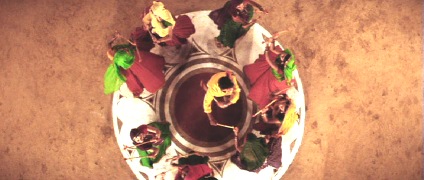 |
The
second theme relates to the discomfort of Indians with the Indian caste
system . A so called
untouchable, with an ability to spin the ball is initially unwelcome on
the team. But he is
slowly accepted on the team and is their eventual hero who confuses the
British batters with his beguiling spin bowling.
In fact he performs a hat-trick by taking 3 consecutive wickets
– a feat applauded by both the British and the villagers.
Spin bowling by Indian teams remains to this day a talent very
few other teams can match. |
|
| . | ||
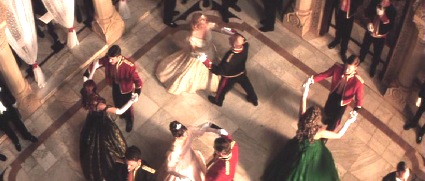 |
Once assembled the team has no idea how to play cricket except Bhuvan telling them that it is similar to playing “ gilli-danda”- a game every Indian boy knows and plays by hitting a small wooden “ gilli “ with a longer stick called “ danda” (imagine playing stick ball and replace ball with a small 6 inch wooden piece). They make homemade bats and a ball, but are lost in their uncoordinated effort to play a game totally alien to them. | |
| Their frustration ends when Elizabeth, the sister of Captain Andrew Russell offers help to the village team. She tells Andrew that she must do this because ‘... what happened to them is totally unfair and I want to give them a fair chance ...”. A beautiful theme here is that the British, in spite of their arrogant ways towards the Indian people, have a sense of fair-play and balancing the playing field for the under-dogs. The match shows many examples of the love of rules, regulations, conventions, etiquette and fair mindedness. This fair play is demonstrated when the commanding officers, higher than Captain Russell, bring in neutral umpires from a the far away Indian city of Kanpur to referee the match. | ||
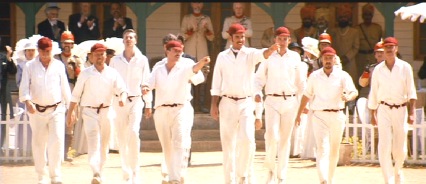 |
The
“High Noon” of the match day arrives with the village team believing
that “... for the Whiteys it’s only a game- for us it is our
life...” and the English team convinced that no one, certainly not
this rag-tag team of bare-footed “ darkie-villagers “, can beat them
at a game that is the very expression of English character.
The match is a three day event, with each team batting once and
the team with the higher score winning.
The wager is to be settled as agreed upon earlier.
The match is played with passion and excitement.
The viewers cannot sit on the fence here - one has to root for
one or the other. |
|
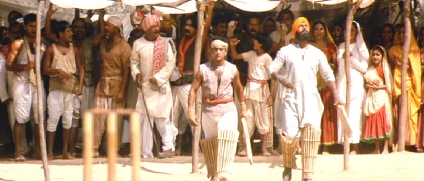 |
There is much ebb and flow to the game. On the night before the final day of play, the movie shows how deeply the Indian psyche is rooted in spirituality. While other cultures may spend time on preparing a detailed game plan to win a match, the village team spends their last night in prayer. They plead with their God to bless their effort with victory for they truly believe “... he who has truth and courage in his heart, it is he who wins at the end...” | |
| The
storyline, the well-timed and moving songs and dances, the vibrant
colours of the scenery and photography and the clear sub-titles make
this movie a feast for the eyes, mind and heart.
Although the film states that Lagaan is fictional, it has piqued
my interest to find out if the story was even broadly based on a similar
event. The final
comment in the movie: “... the name of Bhuvan has been lost in the
pages of history ...” seems to imply some historical basis for the
movie which, for the truth-seekers, would certainly make an interesting
pursuit.
Lagaan
is one of the films nominated for the “Best Foreign Movie“ Oscar.
|
||
|
FILM and DVD Details |
||
|
|
||
| Full Cast and Crew for Lagaan: Once Upon a Time in India (2001) Directed by Ashutosh Gowariker Writing credits (in credits order) Kumar Dave (screenplay) Sanjay Dayma (screenplay) Ashutosh Gowariker (screenplay) Ashutosh Gowariker (story) K.P. Saxena (dialogue) Cast (in credits order) Aamir Khan .... Bhuvan Gracy Singh .... Gauri Rachel Shelley .... Elizabeth Russell Paul Blackthorne .... Captain Andrew Russell Suhasini Mulay .... Yashodamai Kulbhushan Kharbanda .... Rajah Puran Singh Raghuvir Yadav .... Bhura (as Raghuveer Yadav) Rajendra Gupta .... Mukhiya Rajesh Vivek .... Guran Shri Vallabh Vyas .... Ishwar (as Sri Vallabh Vyas) Javed Khan .... Ram Singh Raj Zutshi .... Ismail Akhilendra Mishra .... Arjan Pradeep Rawat .... Deva Daya Shankar Pandey .... Goli Yashpal Sharma .... Lakha Amin Hajee .... Bagha Aditya Lakhia .... Kachra A.K. Hangal .... Shambukaka John Rowe (I) .... Col. Boyer David Gant (I) .... Maj. Warren Jeremy Child (I) .... Maj. Cotton Ben Nealon .... Lt. Smith Anupam Shyam .... Namdeo Raja Awasthi .... Ramprasad Pramatesh Mehta .... Harikaka Bhim Vakani .... Kazi Amin Gazi .... Tipu Anu Ansari .... Jigni Parveen Bano .... Kesarya Chris England .... Yardley Howard Lee (I) .... Burton Simon Holmes (II) .... Brooks Ray Eves .... Willis Jon House .... North Neil Patrick (I) .... Harrisson Jamie Whitby Coles .... Wesson Barry Hart (I) .... Benson Alex Shirtcliff .... Flynn rest of cast listed alphabetically Amitabh Bachchan .... Narrator Produced by Reena Datta .... executive producer Aamir Khan .... producer Reena Khan .... executive producer Original music by A.R. Rahman Cinematography by Anil Mehta Film Editing by Ballu Saluja Casting by Uma Da Cunha Danielle Roffe Production Design by Nitin Desai (as Nitin Chandrakant Desai) Costume Design by Bhanu Athaiya Makeup Department Nicole Demers .... makeup designer Rina Rizzi .... hair designer (as Pina Rizzi) Production Management Nikhat Hegde .... production manager Ranjit Indori .... production manager Shamala S. Rao .... production manager Akram Shah .... production manager Ashok Shinde .... production manager Second Unit Director or Assistant Director Urvashi Chugani .... assistant director Sanjay Dayma .... chief assistant director Reema Kagti .... second assistant director (as Reema Katgi) Apoorva Lakhia .... first assistant director Priyamvada Narayanan .... assistant director Kiran Rao .... assistant director Art Department Dhanabai Ramji Ahir .... set contractor Hemant Bhatkar .... assistant art director Eknath Kadam .... assistant art director Mavji .... set contractor Sanjay Panchal .... assistant art director Girish Patil .... assistant art director Kalpesh Salve .... assistant art director Dilip Satam .... assistant art director Sound Department Sheikh Gulam Hassan .... boom operator Nakul Kamte .... production sound mixer sound designer sound Ashraf Khan .... second boom operator Nazim Naseer Peshiman .... second boom operator S. Sivakumar .... song recording H. Sridhar .... final mixing engineer song recording Other crew Asha Bhosle .... playback singer Vasundhara Das .... playback singer Kishori Gowariker .... playback singer Shankar Mahadevan .... playback singer Lata Mangeshkar .... playback singer Udit Narayan .... playback singer A.R. Rahman .... playback singer Sadhana Sargam .... playback singer Shaan (II) .... playback singer Sukhwinder Singh .... playback singer (as Sukhvinder Singh) Srinivas (II) .... playback singer Anuradha Sriram .... playback singer Vaishali (II) .... playback singer Alka Yagnik .... playback singer |
Technical
Information
Release Information: Aspect Ratio(s): Discographic Information: Edition Details:
|
|
